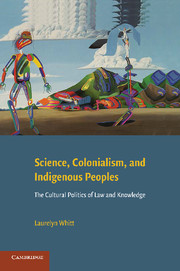Book contents
- Frontmatter
- Contents
- Preface
- Acknowledgments
- First Words
- PART I BIOCOLONIALISM AS IMPERIAL SCIENCE
- 1 Imperialism Then and Now
- 2 Indigenous Knowledge, Power, and Responsibility
- 3 Value-Neutrality and Value-Bifurcation: The Cultural Politics of Science
- PART II THE HUMAN GENOME DIVERSITY PROJECT: A CASE STUDY
- PART III LEGITIMATION: THE RULE AND ROLE OF LAW
- Conclusion – The Politics of Knowledge: Resistance and Recovery
- Bibliography
- Index
- References
3 - Value-Neutrality and Value-Bifurcation: The Cultural Politics of Science
Published online by Cambridge University Press: 04 August 2010
- Frontmatter
- Contents
- Preface
- Acknowledgments
- First Words
- PART I BIOCOLONIALISM AS IMPERIAL SCIENCE
- 1 Imperialism Then and Now
- 2 Indigenous Knowledge, Power, and Responsibility
- 3 Value-Neutrality and Value-Bifurcation: The Cultural Politics of Science
- PART II THE HUMAN GENOME DIVERSITY PROJECT: A CASE STUDY
- PART III LEGITIMATION: THE RULE AND ROLE OF LAW
- Conclusion – The Politics of Knowledge: Resistance and Recovery
- Bibliography
- Index
- References
Summary
Exhibit Seven. Excerpt from testimony by Luca Cavalli-Sforza, population geneticist and principal proponent of the Human Genome Diversity Project (HGDP) at the 1993 Hearing on the HGDP before the U.S. Senate Committee on Governmental Affairs:
Senator Akaka: Preservation of genetic data of near-extinct populations is an important issue that I believe warrants further examination. Would you say that a primary component of your proposed study is the collection of genetic samples from cultures that are vanishing? Why does this project need to be done now? Why the urgency?
Dr. Cavalli-Sforza: We are observing, because of economic development of Third World countries, an enormous increase in migration, and also disappearance of populations living in peripheral locations, and very frequently marginal conditions … If we want to reconstruct populations history, and understand under what conditions certain diseases became prevalent in a population, we have to study these things now, before complete confusion.
Exhibit Eight. Excerpt from testimony provided at a 1993 meeting of the United Nations Commission on Sustainable Development by Victoria Tauli-Corpuz indigenous representative:
After being subjected to ethnocide and genocide for 500 years (which is why we are endangered), the alternative is for our DNA to be collected and stored. This is just a more sophisticated version of how the remains of our ancestors are collected and stored in museums and scientific institutions. Why don't they address the causes of our being endangered instead of spending $20 million for five years to collect and store us in cold laboratories. If this money will be used instead to provide us basic social services and promote our rights as indigenous peoples, then our biodiversity will be protected.
- Type
- Chapter
- Information
- Science, Colonialism, and Indigenous PeoplesThe Cultural Politics of Law and Knowledge, pp. 57 - 80Publisher: Cambridge University PressPrint publication year: 2009



